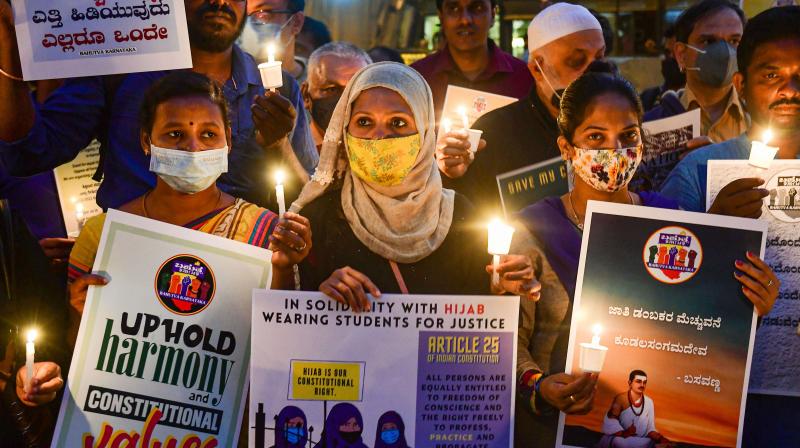Hijab ban: SC agrees to consider hearing pleas against Karnataka HC verdict
Several petitions have been filed in the SC against the HC verdict holding that wearing hijab is not a part of essential religious practice

New Delhi: The Supreme Court on Tuesday agreed to consider listing pleas challenging the Karnataka High Court verdict which had dismissed petitions seeking permission to wear hijab inside classroom.
A bench comprising Chief Justice N V Ramana and Justices Krishna Murari and Hima Kohli took note of the submissions of senior advocate Meenakshi Arora, appearing for one of the petitioners, that the plea needed an urgent hearing.
"I will list it. Wait for two days," the CJI said.
Several petitions have been filed in the apex court against the Karnataka High Court verdict holding that wearing of hijab is not a part of the essential religious practice which can be protected under Article 25 of the Constitution.
The high court had dismissed the petitions filed by a section of Muslim students from the Government Pre-University Girls College in Udupi, seeking permission to wear hijab inside the classroom.
The prescription of school uniform is only a reasonable restriction, constitutionally permissible which the students cannot object to, the high court had said.
In one of the pleas filed in the top court, the petitioner said the high court has "erred in creating a dichotomy of freedom of religion and freedom of conscience wherein the court has inferred that those who follow a religion cannot have the right to conscience.”"
"The high court has failed to note that the right to wear hijab comes under the ambit of the right to privacy under Article 21 of the Constitution of India. It is submitted that the freedom of conscience forms a part of the right to privacy," it said.
The plea said the petitioner had approached the high court seeking redressal for the alleged violation of their fundamental rights against the state government order of February 5, 2022, issued under Sections 7 and 133 of the Karnataka Education Act, 1983.
The high court had maintained that the government has the power to issue impugned order dated February 5, 2022, and no case is made out for its invalidation.
By the said order, the Karnataka government had banned wearing clothes that disturb equality, integrity, and public order in schools and colleges, which the Muslim girls had challenged in the high court.
Challenging the February 5 order of the government, the petitioners had argued before the high court that wearing the Islamic headscarf was an innocent practice of faith and an Essential Religious Practice (ERP) and not a mere display of religious jingoism.
The petitioners had also contended that the restriction violated the freedom of expression under Article 19(1)(A) and Article 21 dealing with personal liberty.

